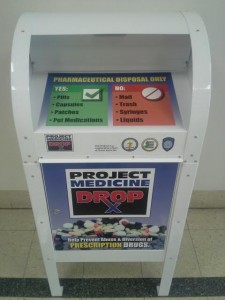By Kelly Corbett
Staff Writer
Last week, the College became a participant in Project Medicine Drop, an effort to end the abuse and diversion of prescription drugs. Located inside the Administrative Building lobby, a Project Medicine Drop box was installed, inviting students and other members of the community to dispose of their expired or unused prescriptions.
The Project Medicine Drop box accepts pills, capsules, patches and even pet medications. However, it does not accept liquids, needles, syringes or trash. The drop box is open 24 hours a day, 365 days a year. Also, it provides not just students at the College a safe place to dispose of all their unwanted and unused medication, but is open to all those living in the area as well.

According to the Project Medicine Drop website, “every day, 40 Americans die from an overdose caused by prescription painkiller abuse.” Currently, overdoses of opioid prescription drugs kill more people in the U.S. than heroin and cocaine combined. Furthermore, in June 2011, the New Jersey State Commission of Investigation reported that a growing number of young people are abusing prescription drugs. Although Project Medicine Drop will not necessarily put an end to prescription drug abuse, it will provide individuals with the opportunity to properly dispose of their medications.
Initially, Project Medicine Drop boxes were installed in law enforcement agencies for people to use. However, the College was fortunate enough to be asked to be a participant in the project.
“When we were offered an opportunity to participate we felt that it would be a valuable service for the TCNJ community and, with the College’s approval, we signed up,” Campus Police Chief John Collins said.
He explained the importance of properly disposing medications and why the drop box is a significant addition to the community, saying, “if medicines are disposed of improperly, there is the potential that children or pets can accidentally ingest them, and that others can obtain and abuse them.”
Furthermore, Collins discussed flushing medications down the toilet, which at one time was viewed as an appropriate disposal option. He said that flushing “has the potential to harm the environment and contaminate water sources and the food chain.”
The drop box will be checked and emptied on a regular basis as part of the College’s agreement with the Division of Consumer Affairs.
Even if the drop box collects a small amount of medication, Collins still believes that it would ultimately be a success because the medicine disposed of “will no longer have the potential to be accidentally ingested, abused or disposed in a manner that creates environmental hazards.”







